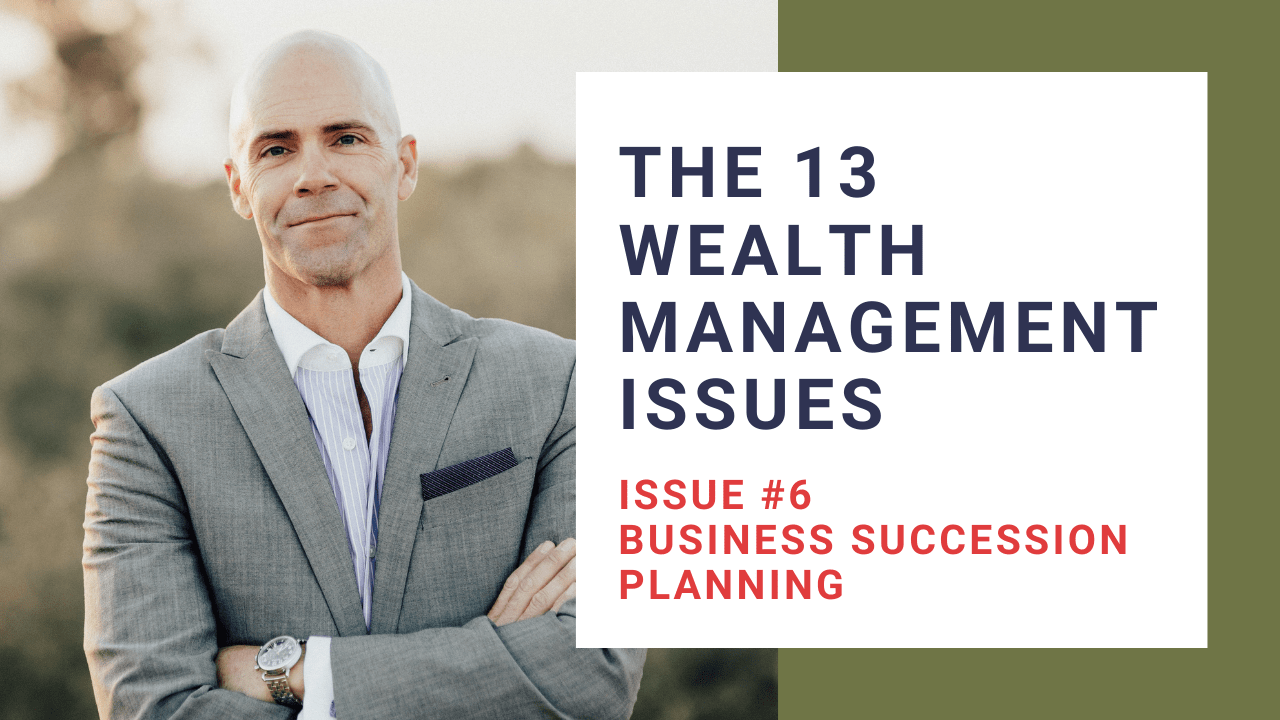
13 Wealth Management Issue #6: Business Succession Planning
The sixth out of our 13 Wealth Management Issues centers around a topic with a slightly misleading title: Business Succession Planning. Like the other wealth issues, it’s critical to have an in-depth discussion regarding the owners’ goals & objectives. Before you can think about transferring your business to a partner or family, your advisor needs to ensure that both your personal and business needs are being addressed during the tenure of your ownership. Let’s get started.
Business Succession Planning
Number 6 out of 13 in our Wealth Management Issues Series
We know that before you can get to the finish line and transfer your practice, there are several other issues you will face along the way, just like you face them with your personal wealth.
So far, we have written about several topics about which you should expect to communicate with your advisor. In addition to your investments and asset allocation; you should be having conversations about your retirement, your family’s risk management & insurance plans, your cash flow and debt strategies, your education and eldercare planning needs, your charitable inclinations and more. But what about your business? We know that your practice is likely your primary source of your wealth, thus, if your business needs are not handled, there is little chance that your personal wealth will grow.
This begs the question: What role should your advisor have in your business?
Your trusted advisor should be talking about your personal financial goals, as well as your business goals. Your advisor should discuss issues that can help you grow your practice, not just items that grow the practice of your advisor. These should be discussions around your working capital and how you are managing cash flow and liquidity. Will you need to make investments in more equipment? Will you plan to open a second or third location and require additional real estate? If so, are you discussing how you will fund or leverage that expansion? You’ve likely talked about your personal retirement, but what about the retirement plans of those in your employment in your practice? You have covered your personal risk management strategy, but what about the protection needs of your business?
Your financial advisor should be advising you on your entire financial life, not just your personal wealth. This will eventually bring us to the transfer of your business. It should– like so many things that have made you successful– be intentional. Very intentional.
Transferring the ownership of a business is time consuming, complex, and often emotional for the party that is exiting the business. There are four options for a business owner:
1 & 2) To transfer to children/descendants during life/before death, and
3 & 4) To sell the business to employees or a third-party entity during life/before death.
Each of these options are available to business owners during their lives or after their deaths. Planning for this inevitable transfer is the key. The timing of the transfer or sale, and the resulting transfer tax or income tax issues, need to be addressed in each business owner’s wealth management plan. Additionally, and likely expectedly, the nature and type of taxation planning require specific focus as transfer taxes will be determined not by Congress and the IRS, but by your ability to plan for this event. Annual exclusion/exemption. Lifetime gift exemption. Transfer interests. Estate tax considerations. Capital gain considerations. Asset protection. Transfer strategies. These are topics of conversation you should be having with your wealth strategist.
When we begin discussions with our business owner clients, we find they fall into one of three categories:
- They have a fully funded plan with clear instructions and documentation for successors and heirs
- They have an unfunded succession plan, where plans are drawn up but lack funding of buy-sell agreements
- There is no documented succession plan, meaning there is a lack of any plan or documentation about the intentions
The biggest risk a business owner maintains is the failure of having a written and/or unfunded exit plan. Or else, everything would likely need to go perfectly or without a hitch to pursue the stated goals. In many cases, folks are “too busy” or it doesn’t seem urgent to them. In others, clients are overwhelmed. Often, our commentary to clients is something to the effect of “why work for a lifetime to build something so special and meaningful to you and your family only to leave it in jeopardy?” Additional important considerations or conversations to have include:
- If something happened to you, what happens to the company?
- Do you have a formal written plan?
- Is your plan funded?
- Do your successors KNOW what the plan is?
There are many moving parts to managing and growing your business; succession planning is just one of many critical components. If your current advisor isn’t talking to you about your working capital needs or funding future expansion, are you really receiving the best advice and counsel? It’s critical to integrate the tangible logistical components with the emotional and family-based considerations. Be sure to discuss your business goals with your advisor, not just your personal financial details. When it finally comes to transition and succession planning, the bottom line is to develop a plan based on all the information above and move forward judiciously.
When considering these issues, it’s important to ask yourself, how do any of these affect you, your family, and your goals? The following installments will cover each of these Wealth Management Issues in greater detail. Our hope is this series of chapters will provide not only an educational forum but also promote thought, leading to action…in a holistic manner, of course. Learn about our other 13 Wealth Management Issues here.
Watch our Whiskey & Wealth Wednesday video of this article:
If you would like to learn more about this subject please contact us and we’ll be happy to help.
By Anthony C. Williams, CWS, ChFC, MRFC, CLU | Investment Advisor Representative | President & Founding Partner of Mosaic Financial Associates & Orthopaedist Advisory Group | Securities and advisory services offered through Cetera Advisors LLC, Member FINRA/SIPC, a broker/dealer and a Registered Investment Advisor. Cetera is under separate ownership from any other named entity.







